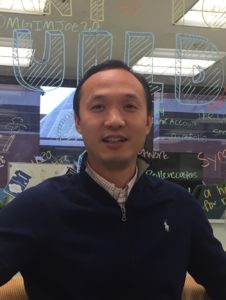Dr. Teng Zhang is an Assistant professor in the Department of Mechanical and Aerospace Engineering at Syracuse University. Prior to Joining Syracuse, he was a Postdoctoral associate in the Department of Mechanical Engineering at MIT (2014-2015) and received his PhD degree at Brown University in 2015. He received his Bachelor (2007) and Master (2010) degrees at Dalian University of Technology, China. His current research focus is mechanics of interface and instability, examples including wrinkling patterns, adhesion and wetting, multistable structures, and morphing food. Dr. Zhang has received the NSF CAREER Award. He enjoys working with people with various backgrounds, such as mechanics, design, physics, and bioengineering to address interdisciplinary challenges.
Read Teng’s Emerging Investigator article “Maggtice: a lattice model for hard-magnetic soft materials” and check out all of the 2021 Soft Matter Emerging Investigator articles here.
How do you feel about Soft Matter as a place to publish research on this topic?
Soft Matter is a great place to publish our work because it has a broad and diverse community. The goal of the research is to provide a simple and versatile simulation tool for the deformation and Multiphysics coupling of smart and soft magnetic materials and structures, which can be leveraged by researchers from various fields, from soft robotic, material science, physics, and mechanics.
What aspect of your work are you most excited about at the moment and what do you find most challenging about your research?
I am really excited about harnessing structure instabilities and multiphysics coupling (e.g., swelling and deformation) to realize unprecedented functions and devices. My research mainly focuses on nonlinear problems. They are challenging to model and simulate as well as calibrate and validate with experiments.
In your opinion, what are the most important questions to be asked/answered in this field of research?
Uncovering the working mechanism and design principles of various hybrid structures, such as hard and soft, active and passive, and solid and liquid. Nature has all these examples and can be a very good resource for new research questions and guidelines of engineering solutions.
Can you share one piece of career-related advice or wisdom with other early career scientists?
Choose the topics you are really interested in and good at. Establish your core expertise and then talk with people in different fields to identify new research directions and collaborations.











